Psychopharmacology: George Case Study
VerifiedAdded on 2022/12/29
|16
|4329
|1
AI Summary
This case study focuses on the implications of psychotropic medications on George's mental health condition and discusses the physiological implications and reasons for his unusual behaviors. It also suggests strategies for conveying information to George's parents.
Contribute Materials
Your contribution can guide someone’s learning journey. Share your
documents today.
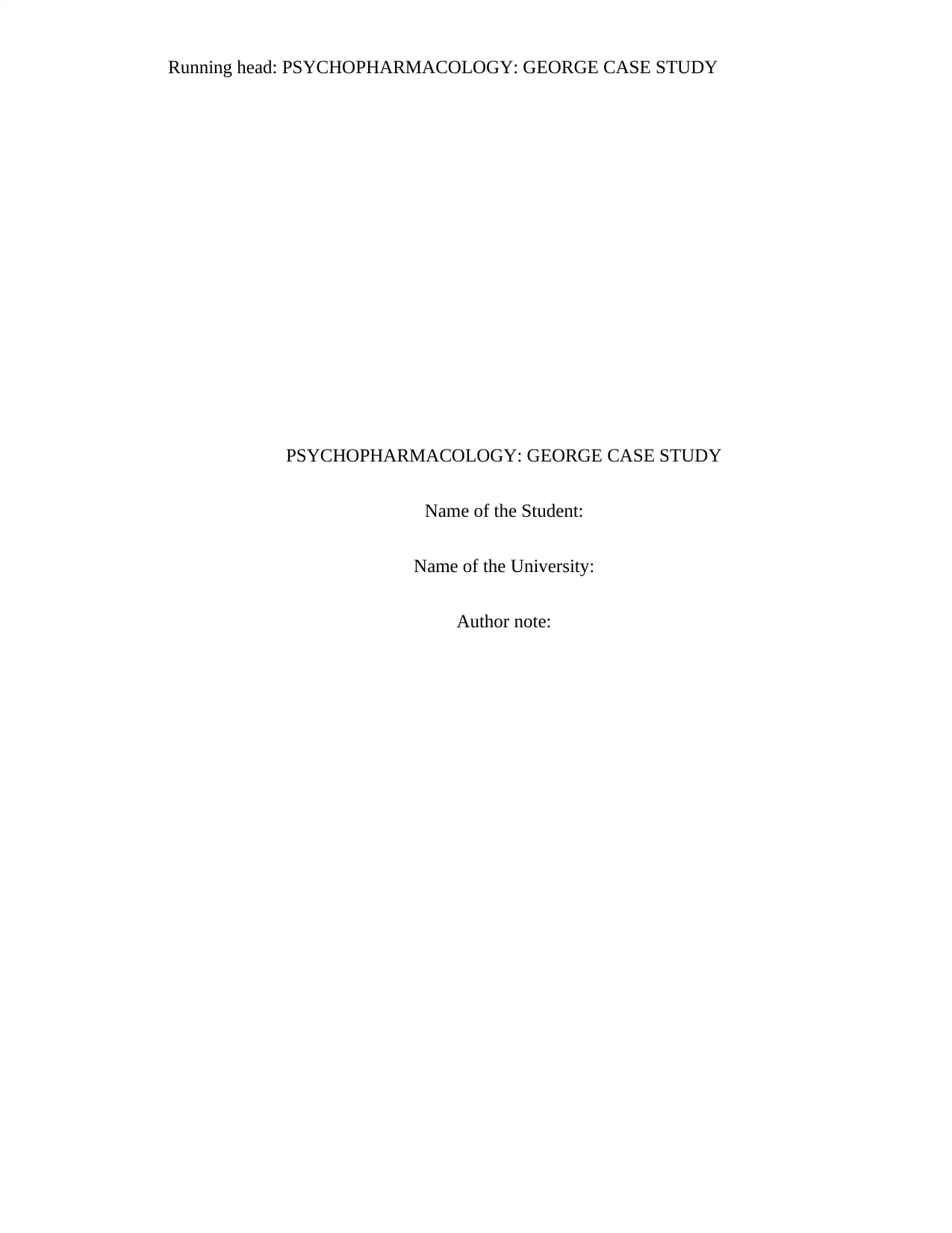
Running head: PSYCHOPHARMACOLOGY: GEORGE CASE STUDY
PSYCHOPHARMACOLOGY: GEORGE CASE STUDY
Name of the Student:
Name of the University:
Author note:
PSYCHOPHARMACOLOGY: GEORGE CASE STUDY
Name of the Student:
Name of the University:
Author note:
Secure Best Marks with AI Grader
Need help grading? Try our AI Grader for instant feedback on your assignments.
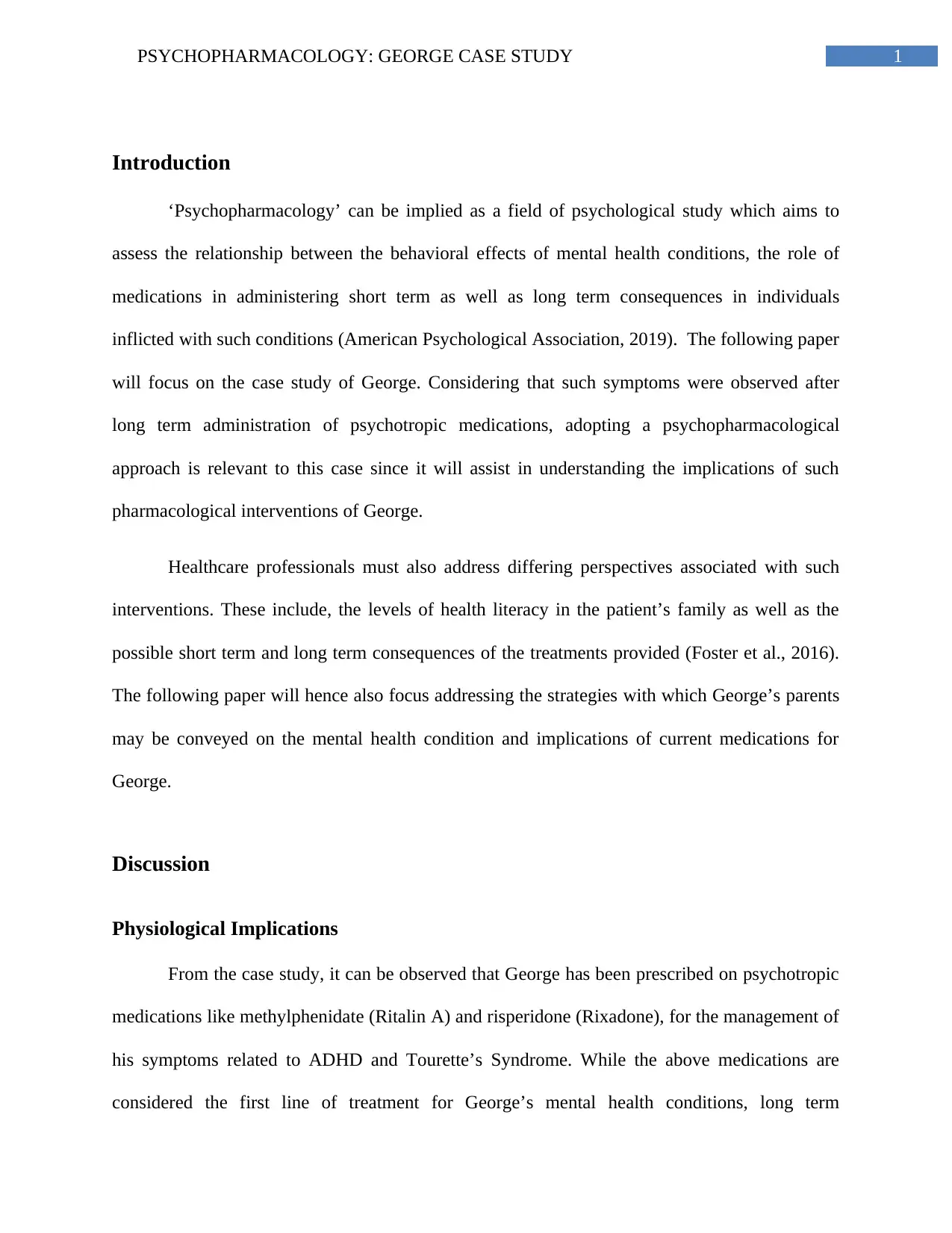
1PSYCHOPHARMACOLOGY: GEORGE CASE STUDY
Introduction
‘Psychopharmacology’ can be implied as a field of psychological study which aims to
assess the relationship between the behavioral effects of mental health conditions, the role of
medications in administering short term as well as long term consequences in individuals
inflicted with such conditions (American Psychological Association, 2019). The following paper
will focus on the case study of George. Considering that such symptoms were observed after
long term administration of psychotropic medications, adopting a psychopharmacological
approach is relevant to this case since it will assist in understanding the implications of such
pharmacological interventions of George.
Healthcare professionals must also address differing perspectives associated with such
interventions. These include, the levels of health literacy in the patient’s family as well as the
possible short term and long term consequences of the treatments provided (Foster et al., 2016).
The following paper will hence also focus addressing the strategies with which George’s parents
may be conveyed on the mental health condition and implications of current medications for
George.
Discussion
Physiological Implications
From the case study, it can be observed that George has been prescribed on psychotropic
medications like methylphenidate (Ritalin A) and risperidone (Rixadone), for the management of
his symptoms related to ADHD and Tourette’s Syndrome. While the above medications are
considered the first line of treatment for George’s mental health conditions, long term
Introduction
‘Psychopharmacology’ can be implied as a field of psychological study which aims to
assess the relationship between the behavioral effects of mental health conditions, the role of
medications in administering short term as well as long term consequences in individuals
inflicted with such conditions (American Psychological Association, 2019). The following paper
will focus on the case study of George. Considering that such symptoms were observed after
long term administration of psychotropic medications, adopting a psychopharmacological
approach is relevant to this case since it will assist in understanding the implications of such
pharmacological interventions of George.
Healthcare professionals must also address differing perspectives associated with such
interventions. These include, the levels of health literacy in the patient’s family as well as the
possible short term and long term consequences of the treatments provided (Foster et al., 2016).
The following paper will hence also focus addressing the strategies with which George’s parents
may be conveyed on the mental health condition and implications of current medications for
George.
Discussion
Physiological Implications
From the case study, it can be observed that George has been prescribed on psychotropic
medications like methylphenidate (Ritalin A) and risperidone (Rixadone), for the management of
his symptoms related to ADHD and Tourette’s Syndrome. While the above medications are
considered the first line of treatment for George’s mental health conditions, long term
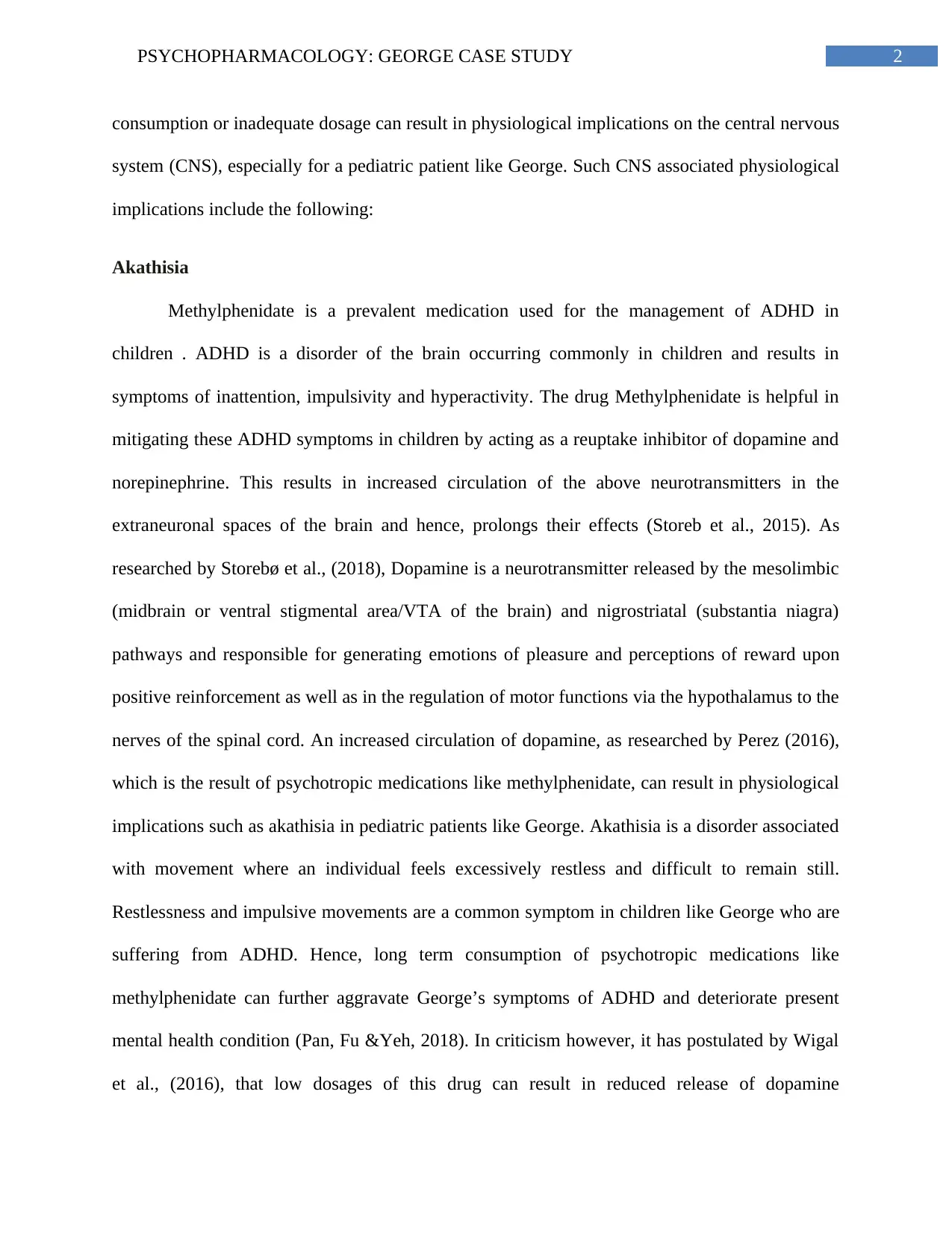
2PSYCHOPHARMACOLOGY: GEORGE CASE STUDY
consumption or inadequate dosage can result in physiological implications on the central nervous
system (CNS), especially for a pediatric patient like George. Such CNS associated physiological
implications include the following:
Akathisia
Methylphenidate is a prevalent medication used for the management of ADHD in
children . ADHD is a disorder of the brain occurring commonly in children and results in
symptoms of inattention, impulsivity and hyperactivity. The drug Methylphenidate is helpful in
mitigating these ADHD symptoms in children by acting as a reuptake inhibitor of dopamine and
norepinephrine. This results in increased circulation of the above neurotransmitters in the
extraneuronal spaces of the brain and hence, prolongs their effects (Storeb et al., 2015). As
researched by Storebø et al., (2018), Dopamine is a neurotransmitter released by the mesolimbic
(midbrain or ventral stigmental area/VTA of the brain) and nigrostriatal (substantia niagra)
pathways and responsible for generating emotions of pleasure and perceptions of reward upon
positive reinforcement as well as in the regulation of motor functions via the hypothalamus to the
nerves of the spinal cord. An increased circulation of dopamine, as researched by Perez (2016),
which is the result of psychotropic medications like methylphenidate, can result in physiological
implications such as akathisia in pediatric patients like George. Akathisia is a disorder associated
with movement where an individual feels excessively restless and difficult to remain still.
Restlessness and impulsive movements are a common symptom in children like George who are
suffering from ADHD. Hence, long term consumption of psychotropic medications like
methylphenidate can further aggravate George’s symptoms of ADHD and deteriorate present
mental health condition (Pan, Fu &Yeh, 2018). In criticism however, it has postulated by Wigal
et al., (2016), that low dosages of this drug can result in reduced release of dopamine
consumption or inadequate dosage can result in physiological implications on the central nervous
system (CNS), especially for a pediatric patient like George. Such CNS associated physiological
implications include the following:
Akathisia
Methylphenidate is a prevalent medication used for the management of ADHD in
children . ADHD is a disorder of the brain occurring commonly in children and results in
symptoms of inattention, impulsivity and hyperactivity. The drug Methylphenidate is helpful in
mitigating these ADHD symptoms in children by acting as a reuptake inhibitor of dopamine and
norepinephrine. This results in increased circulation of the above neurotransmitters in the
extraneuronal spaces of the brain and hence, prolongs their effects (Storeb et al., 2015). As
researched by Storebø et al., (2018), Dopamine is a neurotransmitter released by the mesolimbic
(midbrain or ventral stigmental area/VTA of the brain) and nigrostriatal (substantia niagra)
pathways and responsible for generating emotions of pleasure and perceptions of reward upon
positive reinforcement as well as in the regulation of motor functions via the hypothalamus to the
nerves of the spinal cord. An increased circulation of dopamine, as researched by Perez (2016),
which is the result of psychotropic medications like methylphenidate, can result in physiological
implications such as akathisia in pediatric patients like George. Akathisia is a disorder associated
with movement where an individual feels excessively restless and difficult to remain still.
Restlessness and impulsive movements are a common symptom in children like George who are
suffering from ADHD. Hence, long term consumption of psychotropic medications like
methylphenidate can further aggravate George’s symptoms of ADHD and deteriorate present
mental health condition (Pan, Fu &Yeh, 2018). In criticism however, it has postulated by Wigal
et al., (2016), that low dosages of this drug can result in reduced release of dopamine
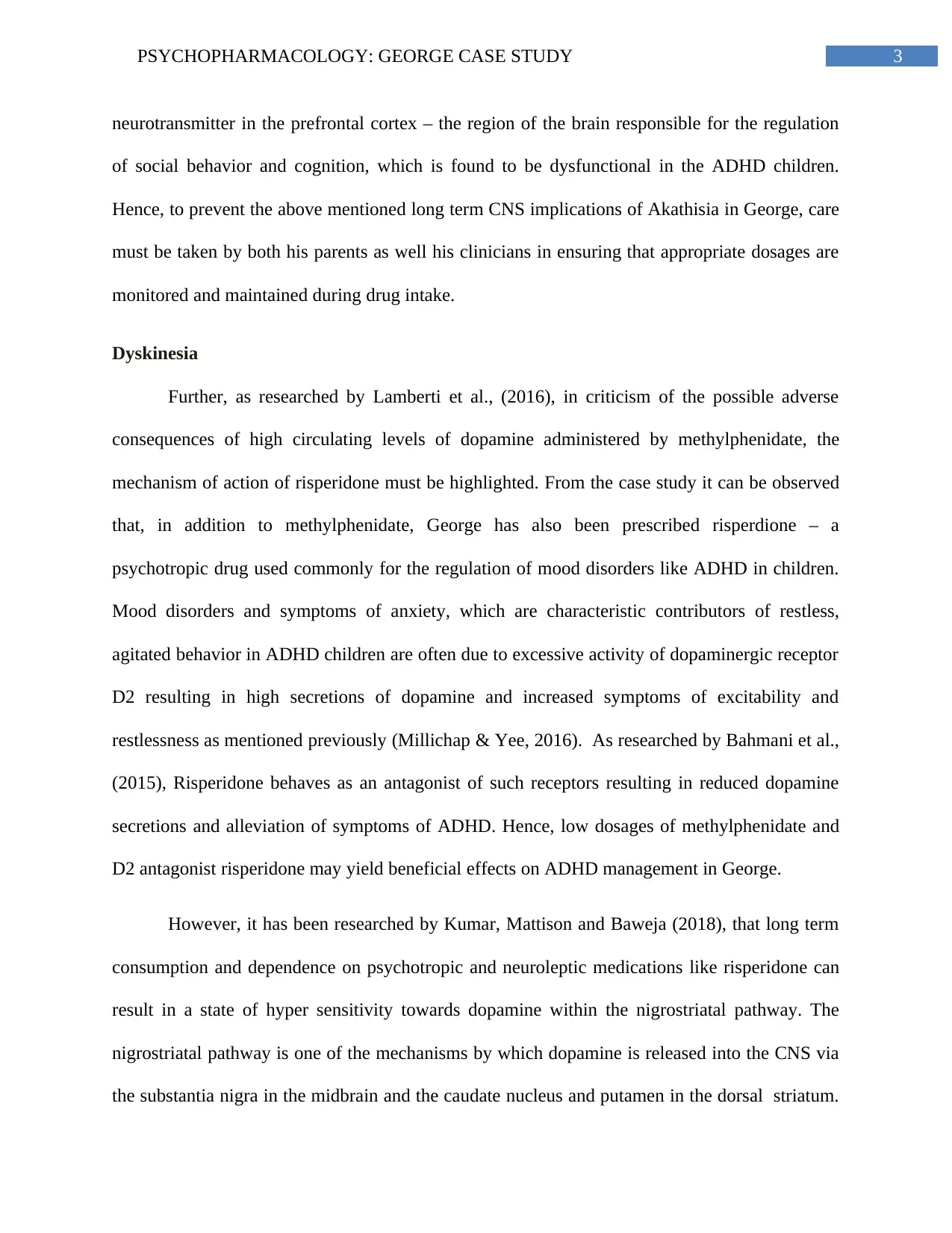
3PSYCHOPHARMACOLOGY: GEORGE CASE STUDY
neurotransmitter in the prefrontal cortex – the region of the brain responsible for the regulation
of social behavior and cognition, which is found to be dysfunctional in the ADHD children.
Hence, to prevent the above mentioned long term CNS implications of Akathisia in George, care
must be taken by both his parents as well his clinicians in ensuring that appropriate dosages are
monitored and maintained during drug intake.
Dyskinesia
Further, as researched by Lamberti et al., (2016), in criticism of the possible adverse
consequences of high circulating levels of dopamine administered by methylphenidate, the
mechanism of action of risperidone must be highlighted. From the case study it can be observed
that, in addition to methylphenidate, George has also been prescribed risperdione – a
psychotropic drug used commonly for the regulation of mood disorders like ADHD in children.
Mood disorders and symptoms of anxiety, which are characteristic contributors of restless,
agitated behavior in ADHD children are often due to excessive activity of dopaminergic receptor
D2 resulting in high secretions of dopamine and increased symptoms of excitability and
restlessness as mentioned previously (Millichap & Yee, 2016). As researched by Bahmani et al.,
(2015), Risperidone behaves as an antagonist of such receptors resulting in reduced dopamine
secretions and alleviation of symptoms of ADHD. Hence, low dosages of methylphenidate and
D2 antagonist risperidone may yield beneficial effects on ADHD management in George.
However, it has been researched by Kumar, Mattison and Baweja (2018), that long term
consumption and dependence on psychotropic and neuroleptic medications like risperidone can
result in a state of hyper sensitivity towards dopamine within the nigrostriatal pathway. The
nigrostriatal pathway is one of the mechanisms by which dopamine is released into the CNS via
the substantia nigra in the midbrain and the caudate nucleus and putamen in the dorsal striatum.
neurotransmitter in the prefrontal cortex – the region of the brain responsible for the regulation
of social behavior and cognition, which is found to be dysfunctional in the ADHD children.
Hence, to prevent the above mentioned long term CNS implications of Akathisia in George, care
must be taken by both his parents as well his clinicians in ensuring that appropriate dosages are
monitored and maintained during drug intake.
Dyskinesia
Further, as researched by Lamberti et al., (2016), in criticism of the possible adverse
consequences of high circulating levels of dopamine administered by methylphenidate, the
mechanism of action of risperidone must be highlighted. From the case study it can be observed
that, in addition to methylphenidate, George has also been prescribed risperdione – a
psychotropic drug used commonly for the regulation of mood disorders like ADHD in children.
Mood disorders and symptoms of anxiety, which are characteristic contributors of restless,
agitated behavior in ADHD children are often due to excessive activity of dopaminergic receptor
D2 resulting in high secretions of dopamine and increased symptoms of excitability and
restlessness as mentioned previously (Millichap & Yee, 2016). As researched by Bahmani et al.,
(2015), Risperidone behaves as an antagonist of such receptors resulting in reduced dopamine
secretions and alleviation of symptoms of ADHD. Hence, low dosages of methylphenidate and
D2 antagonist risperidone may yield beneficial effects on ADHD management in George.
However, it has been researched by Kumar, Mattison and Baweja (2018), that long term
consumption and dependence on psychotropic and neuroleptic medications like risperidone can
result in a state of hyper sensitivity towards dopamine within the nigrostriatal pathway. The
nigrostriatal pathway is one of the mechanisms by which dopamine is released into the CNS via
the substantia nigra in the midbrain and the caudate nucleus and putamen in the dorsal striatum.
Secure Best Marks with AI Grader
Need help grading? Try our AI Grader for instant feedback on your assignments.
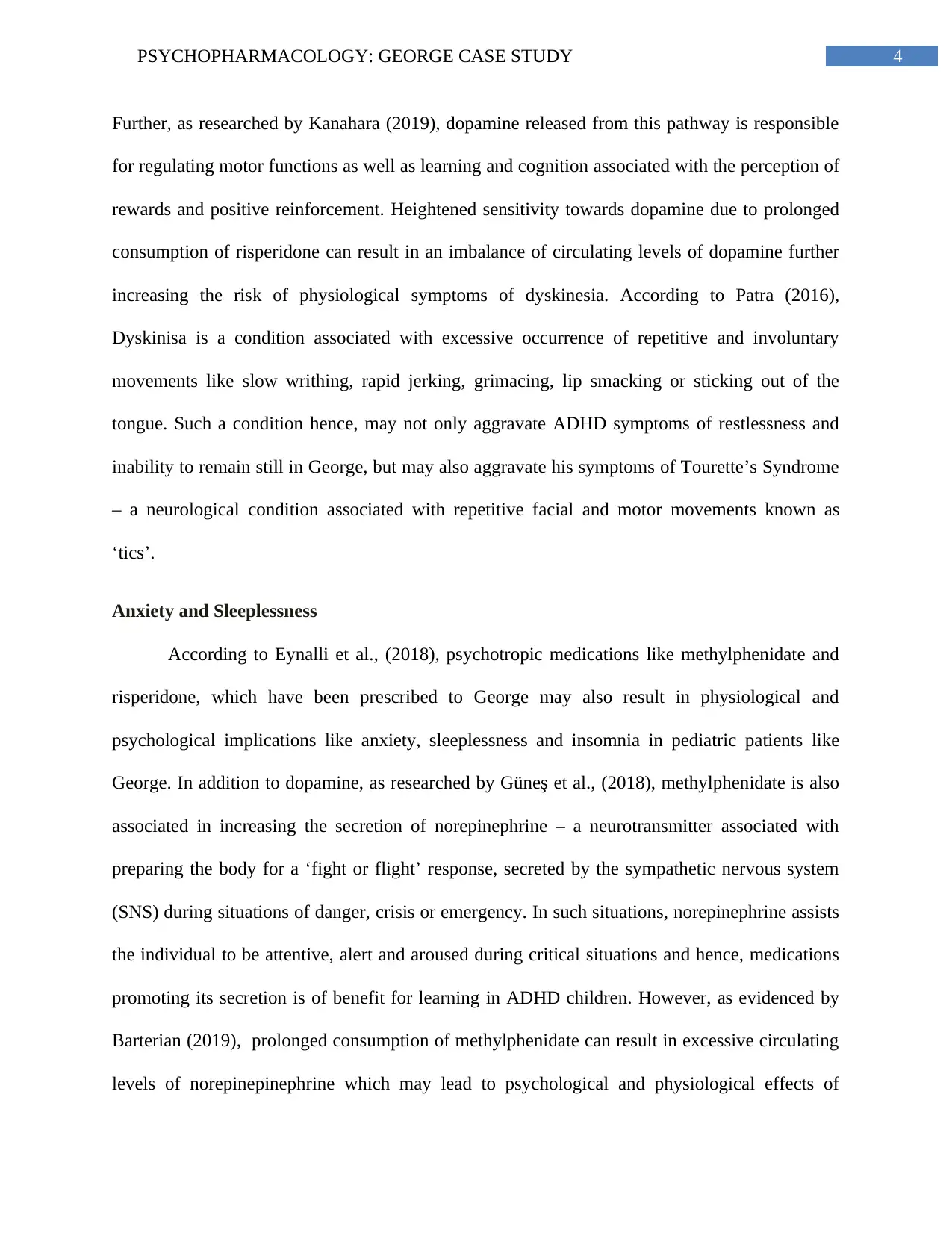
4PSYCHOPHARMACOLOGY: GEORGE CASE STUDY
Further, as researched by Kanahara (2019), dopamine released from this pathway is responsible
for regulating motor functions as well as learning and cognition associated with the perception of
rewards and positive reinforcement. Heightened sensitivity towards dopamine due to prolonged
consumption of risperidone can result in an imbalance of circulating levels of dopamine further
increasing the risk of physiological symptoms of dyskinesia. According to Patra (2016),
Dyskinisa is a condition associated with excessive occurrence of repetitive and involuntary
movements like slow writhing, rapid jerking, grimacing, lip smacking or sticking out of the
tongue. Such a condition hence, may not only aggravate ADHD symptoms of restlessness and
inability to remain still in George, but may also aggravate his symptoms of Tourette’s Syndrome
– a neurological condition associated with repetitive facial and motor movements known as
‘tics’.
Anxiety and Sleeplessness
According to Eynalli et al., (2018), psychotropic medications like methylphenidate and
risperidone, which have been prescribed to George may also result in physiological and
psychological implications like anxiety, sleeplessness and insomnia in pediatric patients like
George. In addition to dopamine, as researched by Güneş et al., (2018), methylphenidate is also
associated in increasing the secretion of norepinephrine – a neurotransmitter associated with
preparing the body for a ‘fight or flight’ response, secreted by the sympathetic nervous system
(SNS) during situations of danger, crisis or emergency. In such situations, norepinephrine assists
the individual to be attentive, alert and aroused during critical situations and hence, medications
promoting its secretion is of benefit for learning in ADHD children. However, as evidenced by
Barterian (2019), prolonged consumption of methylphenidate can result in excessive circulating
levels of norepinepinephrine which may lead to psychological and physiological effects of
Further, as researched by Kanahara (2019), dopamine released from this pathway is responsible
for regulating motor functions as well as learning and cognition associated with the perception of
rewards and positive reinforcement. Heightened sensitivity towards dopamine due to prolonged
consumption of risperidone can result in an imbalance of circulating levels of dopamine further
increasing the risk of physiological symptoms of dyskinesia. According to Patra (2016),
Dyskinisa is a condition associated with excessive occurrence of repetitive and involuntary
movements like slow writhing, rapid jerking, grimacing, lip smacking or sticking out of the
tongue. Such a condition hence, may not only aggravate ADHD symptoms of restlessness and
inability to remain still in George, but may also aggravate his symptoms of Tourette’s Syndrome
– a neurological condition associated with repetitive facial and motor movements known as
‘tics’.
Anxiety and Sleeplessness
According to Eynalli et al., (2018), psychotropic medications like methylphenidate and
risperidone, which have been prescribed to George may also result in physiological and
psychological implications like anxiety, sleeplessness and insomnia in pediatric patients like
George. In addition to dopamine, as researched by Güneş et al., (2018), methylphenidate is also
associated in increasing the secretion of norepinephrine – a neurotransmitter associated with
preparing the body for a ‘fight or flight’ response, secreted by the sympathetic nervous system
(SNS) during situations of danger, crisis or emergency. In such situations, norepinephrine assists
the individual to be attentive, alert and aroused during critical situations and hence, medications
promoting its secretion is of benefit for learning in ADHD children. However, as evidenced by
Barterian (2019), prolonged consumption of methylphenidate can result in excessive circulating
levels of norepinepinephrine which may lead to psychological and physiological effects of
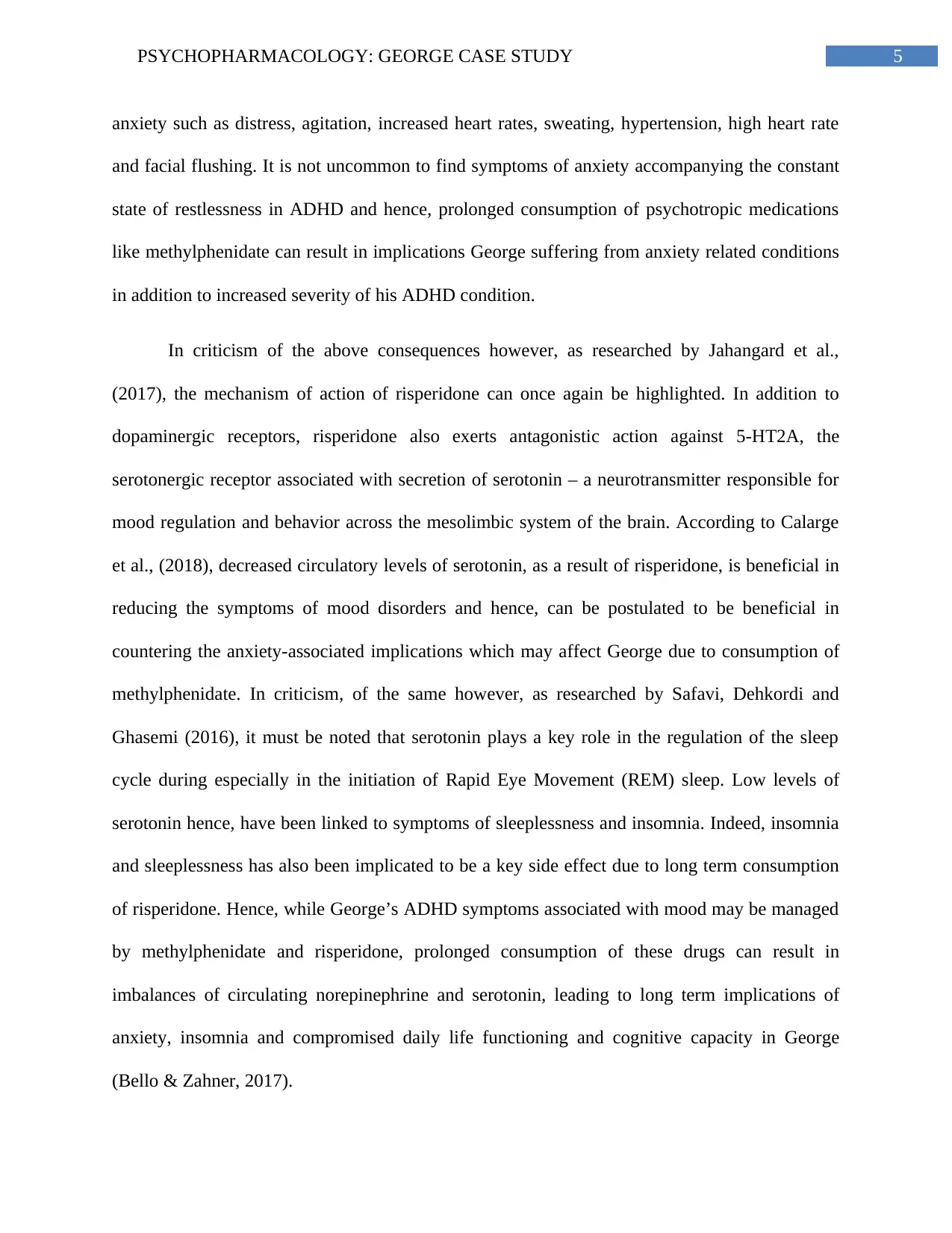
5PSYCHOPHARMACOLOGY: GEORGE CASE STUDY
anxiety such as distress, agitation, increased heart rates, sweating, hypertension, high heart rate
and facial flushing. It is not uncommon to find symptoms of anxiety accompanying the constant
state of restlessness in ADHD and hence, prolonged consumption of psychotropic medications
like methylphenidate can result in implications George suffering from anxiety related conditions
in addition to increased severity of his ADHD condition.
In criticism of the above consequences however, as researched by Jahangard et al.,
(2017), the mechanism of action of risperidone can once again be highlighted. In addition to
dopaminergic receptors, risperidone also exerts antagonistic action against 5-HT2A, the
serotonergic receptor associated with secretion of serotonin – a neurotransmitter responsible for
mood regulation and behavior across the mesolimbic system of the brain. According to Calarge
et al., (2018), decreased circulatory levels of serotonin, as a result of risperidone, is beneficial in
reducing the symptoms of mood disorders and hence, can be postulated to be beneficial in
countering the anxiety-associated implications which may affect George due to consumption of
methylphenidate. In criticism, of the same however, as researched by Safavi, Dehkordi and
Ghasemi (2016), it must be noted that serotonin plays a key role in the regulation of the sleep
cycle during especially in the initiation of Rapid Eye Movement (REM) sleep. Low levels of
serotonin hence, have been linked to symptoms of sleeplessness and insomnia. Indeed, insomnia
and sleeplessness has also been implicated to be a key side effect due to long term consumption
of risperidone. Hence, while George’s ADHD symptoms associated with mood may be managed
by methylphenidate and risperidone, prolonged consumption of these drugs can result in
imbalances of circulating norepinephrine and serotonin, leading to long term implications of
anxiety, insomnia and compromised daily life functioning and cognitive capacity in George
(Bello & Zahner, 2017).
anxiety such as distress, agitation, increased heart rates, sweating, hypertension, high heart rate
and facial flushing. It is not uncommon to find symptoms of anxiety accompanying the constant
state of restlessness in ADHD and hence, prolonged consumption of psychotropic medications
like methylphenidate can result in implications George suffering from anxiety related conditions
in addition to increased severity of his ADHD condition.
In criticism of the above consequences however, as researched by Jahangard et al.,
(2017), the mechanism of action of risperidone can once again be highlighted. In addition to
dopaminergic receptors, risperidone also exerts antagonistic action against 5-HT2A, the
serotonergic receptor associated with secretion of serotonin – a neurotransmitter responsible for
mood regulation and behavior across the mesolimbic system of the brain. According to Calarge
et al., (2018), decreased circulatory levels of serotonin, as a result of risperidone, is beneficial in
reducing the symptoms of mood disorders and hence, can be postulated to be beneficial in
countering the anxiety-associated implications which may affect George due to consumption of
methylphenidate. In criticism, of the same however, as researched by Safavi, Dehkordi and
Ghasemi (2016), it must be noted that serotonin plays a key role in the regulation of the sleep
cycle during especially in the initiation of Rapid Eye Movement (REM) sleep. Low levels of
serotonin hence, have been linked to symptoms of sleeplessness and insomnia. Indeed, insomnia
and sleeplessness has also been implicated to be a key side effect due to long term consumption
of risperidone. Hence, while George’s ADHD symptoms associated with mood may be managed
by methylphenidate and risperidone, prolonged consumption of these drugs can result in
imbalances of circulating norepinephrine and serotonin, leading to long term implications of
anxiety, insomnia and compromised daily life functioning and cognitive capacity in George
(Bello & Zahner, 2017).
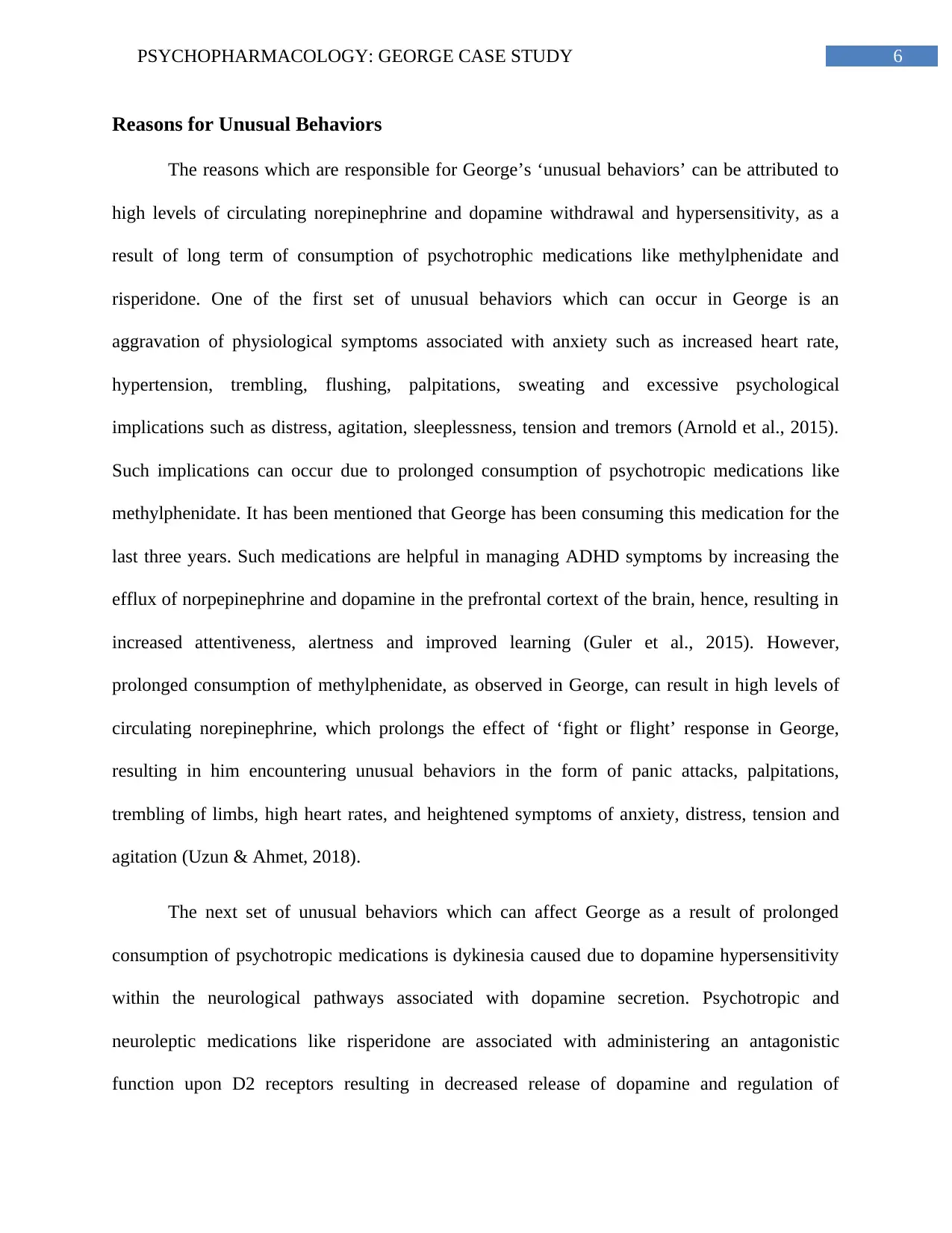
6PSYCHOPHARMACOLOGY: GEORGE CASE STUDY
Reasons for Unusual Behaviors
The reasons which are responsible for George’s ‘unusual behaviors’ can be attributed to
high levels of circulating norepinephrine and dopamine withdrawal and hypersensitivity, as a
result of long term of consumption of psychotrophic medications like methylphenidate and
risperidone. One of the first set of unusual behaviors which can occur in George is an
aggravation of physiological symptoms associated with anxiety such as increased heart rate,
hypertension, trembling, flushing, palpitations, sweating and excessive psychological
implications such as distress, agitation, sleeplessness, tension and tremors (Arnold et al., 2015).
Such implications can occur due to prolonged consumption of psychotropic medications like
methylphenidate. It has been mentioned that George has been consuming this medication for the
last three years. Such medications are helpful in managing ADHD symptoms by increasing the
efflux of norpepinephrine and dopamine in the prefrontal cortext of the brain, hence, resulting in
increased attentiveness, alertness and improved learning (Guler et al., 2015). However,
prolonged consumption of methylphenidate, as observed in George, can result in high levels of
circulating norepinephrine, which prolongs the effect of ‘fight or flight’ response in George,
resulting in him encountering unusual behaviors in the form of panic attacks, palpitations,
trembling of limbs, high heart rates, and heightened symptoms of anxiety, distress, tension and
agitation (Uzun & Ahmet, 2018).
The next set of unusual behaviors which can affect George as a result of prolonged
consumption of psychotropic medications is dykinesia caused due to dopamine hypersensitivity
within the neurological pathways associated with dopamine secretion. Psychotropic and
neuroleptic medications like risperidone are associated with administering an antagonistic
function upon D2 receptors resulting in decreased release of dopamine and regulation of
Reasons for Unusual Behaviors
The reasons which are responsible for George’s ‘unusual behaviors’ can be attributed to
high levels of circulating norepinephrine and dopamine withdrawal and hypersensitivity, as a
result of long term of consumption of psychotrophic medications like methylphenidate and
risperidone. One of the first set of unusual behaviors which can occur in George is an
aggravation of physiological symptoms associated with anxiety such as increased heart rate,
hypertension, trembling, flushing, palpitations, sweating and excessive psychological
implications such as distress, agitation, sleeplessness, tension and tremors (Arnold et al., 2015).
Such implications can occur due to prolonged consumption of psychotropic medications like
methylphenidate. It has been mentioned that George has been consuming this medication for the
last three years. Such medications are helpful in managing ADHD symptoms by increasing the
efflux of norpepinephrine and dopamine in the prefrontal cortext of the brain, hence, resulting in
increased attentiveness, alertness and improved learning (Guler et al., 2015). However,
prolonged consumption of methylphenidate, as observed in George, can result in high levels of
circulating norepinephrine, which prolongs the effect of ‘fight or flight’ response in George,
resulting in him encountering unusual behaviors in the form of panic attacks, palpitations,
trembling of limbs, high heart rates, and heightened symptoms of anxiety, distress, tension and
agitation (Uzun & Ahmet, 2018).
The next set of unusual behaviors which can affect George as a result of prolonged
consumption of psychotropic medications is dykinesia caused due to dopamine hypersensitivity
within the neurological pathways associated with dopamine secretion. Psychotropic and
neuroleptic medications like risperidone are associated with administering an antagonistic
function upon D2 receptors resulting in decreased release of dopamine and regulation of
Paraphrase This Document
Need a fresh take? Get an instant paraphrase of this document with our AI Paraphraser
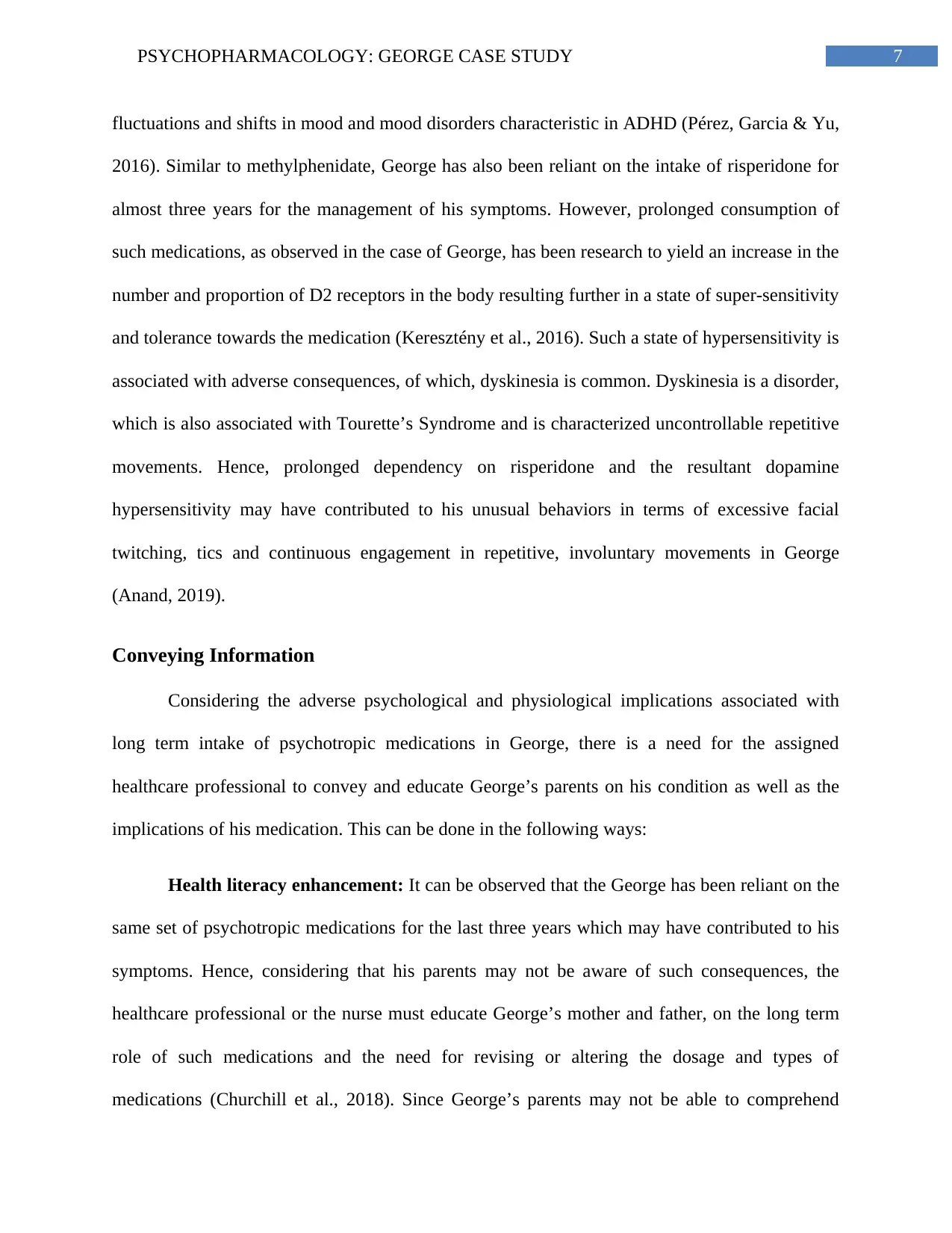
7PSYCHOPHARMACOLOGY: GEORGE CASE STUDY
fluctuations and shifts in mood and mood disorders characteristic in ADHD (Pérez, Garcia & Yu,
2016). Similar to methylphenidate, George has also been reliant on the intake of risperidone for
almost three years for the management of his symptoms. However, prolonged consumption of
such medications, as observed in the case of George, has been research to yield an increase in the
number and proportion of D2 receptors in the body resulting further in a state of super-sensitivity
and tolerance towards the medication (Keresztény et al., 2016). Such a state of hypersensitivity is
associated with adverse consequences, of which, dyskinesia is common. Dyskinesia is a disorder,
which is also associated with Tourette’s Syndrome and is characterized uncontrollable repetitive
movements. Hence, prolonged dependency on risperidone and the resultant dopamine
hypersensitivity may have contributed to his unusual behaviors in terms of excessive facial
twitching, tics and continuous engagement in repetitive, involuntary movements in George
(Anand, 2019).
Conveying Information
Considering the adverse psychological and physiological implications associated with
long term intake of psychotropic medications in George, there is a need for the assigned
healthcare professional to convey and educate George’s parents on his condition as well as the
implications of his medication. This can be done in the following ways:
Health literacy enhancement: It can be observed that the George has been reliant on the
same set of psychotropic medications for the last three years which may have contributed to his
symptoms. Hence, considering that his parents may not be aware of such consequences, the
healthcare professional or the nurse must educate George’s mother and father, on the long term
role of such medications and the need for revising or altering the dosage and types of
medications (Churchill et al., 2018). Since George’s parents may not be able to comprehend
fluctuations and shifts in mood and mood disorders characteristic in ADHD (Pérez, Garcia & Yu,
2016). Similar to methylphenidate, George has also been reliant on the intake of risperidone for
almost three years for the management of his symptoms. However, prolonged consumption of
such medications, as observed in the case of George, has been research to yield an increase in the
number and proportion of D2 receptors in the body resulting further in a state of super-sensitivity
and tolerance towards the medication (Keresztény et al., 2016). Such a state of hypersensitivity is
associated with adverse consequences, of which, dyskinesia is common. Dyskinesia is a disorder,
which is also associated with Tourette’s Syndrome and is characterized uncontrollable repetitive
movements. Hence, prolonged dependency on risperidone and the resultant dopamine
hypersensitivity may have contributed to his unusual behaviors in terms of excessive facial
twitching, tics and continuous engagement in repetitive, involuntary movements in George
(Anand, 2019).
Conveying Information
Considering the adverse psychological and physiological implications associated with
long term intake of psychotropic medications in George, there is a need for the assigned
healthcare professional to convey and educate George’s parents on his condition as well as the
implications of his medication. This can be done in the following ways:
Health literacy enhancement: It can be observed that the George has been reliant on the
same set of psychotropic medications for the last three years which may have contributed to his
symptoms. Hence, considering that his parents may not be aware of such consequences, the
healthcare professional or the nurse must educate George’s mother and father, on the long term
role of such medications and the need for revising or altering the dosage and types of
medications (Churchill et al., 2018). Since George’s parents may not be able to comprehend
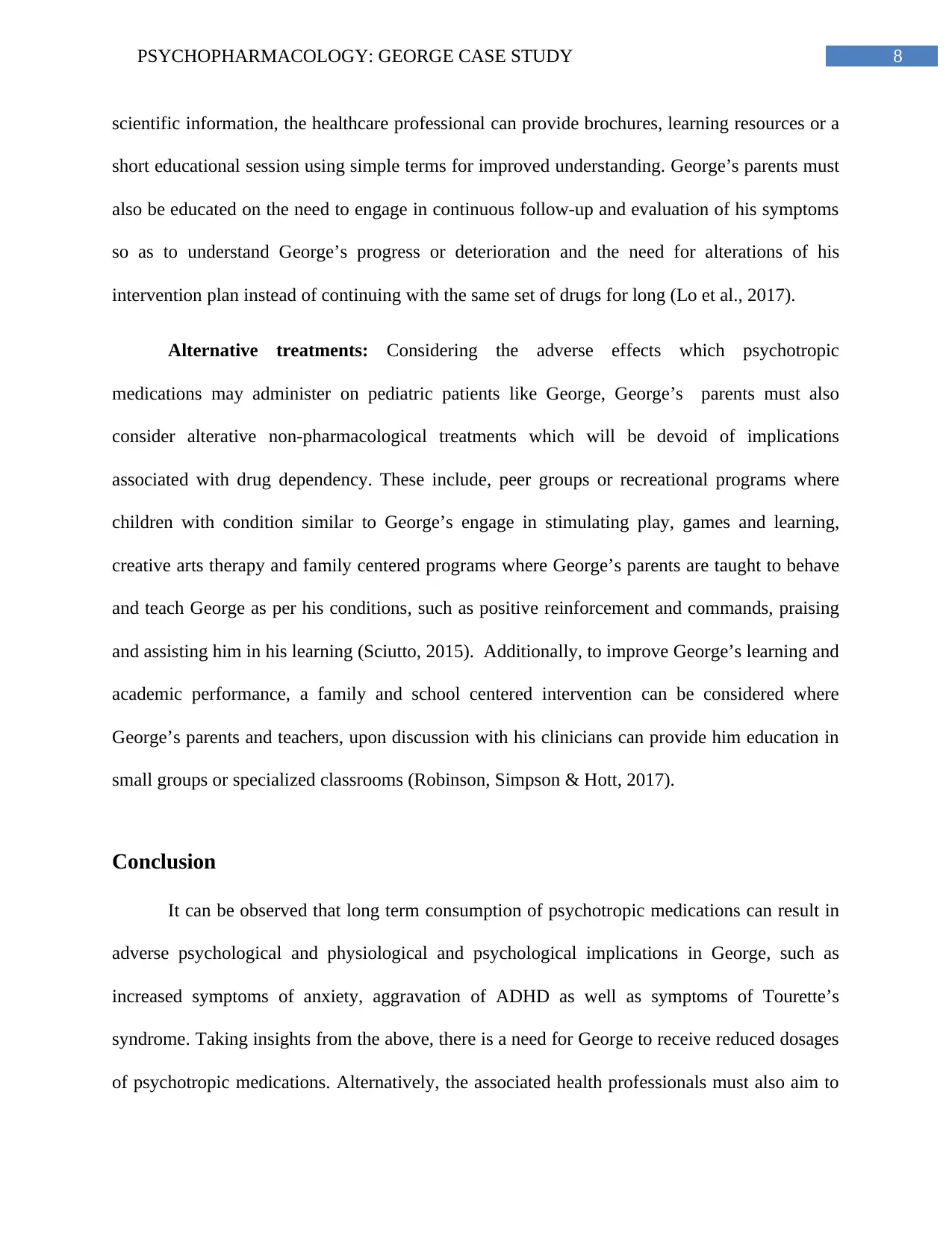
8PSYCHOPHARMACOLOGY: GEORGE CASE STUDY
scientific information, the healthcare professional can provide brochures, learning resources or a
short educational session using simple terms for improved understanding. George’s parents must
also be educated on the need to engage in continuous follow-up and evaluation of his symptoms
so as to understand George’s progress or deterioration and the need for alterations of his
intervention plan instead of continuing with the same set of drugs for long (Lo et al., 2017).
Alternative treatments: Considering the adverse effects which psychotropic
medications may administer on pediatric patients like George, George’s parents must also
consider alterative non-pharmacological treatments which will be devoid of implications
associated with drug dependency. These include, peer groups or recreational programs where
children with condition similar to George’s engage in stimulating play, games and learning,
creative arts therapy and family centered programs where George’s parents are taught to behave
and teach George as per his conditions, such as positive reinforcement and commands, praising
and assisting him in his learning (Sciutto, 2015). Additionally, to improve George’s learning and
academic performance, a family and school centered intervention can be considered where
George’s parents and teachers, upon discussion with his clinicians can provide him education in
small groups or specialized classrooms (Robinson, Simpson & Hott, 2017).
Conclusion
It can be observed that long term consumption of psychotropic medications can result in
adverse psychological and physiological and psychological implications in George, such as
increased symptoms of anxiety, aggravation of ADHD as well as symptoms of Tourette’s
syndrome. Taking insights from the above, there is a need for George to receive reduced dosages
of psychotropic medications. Alternatively, the associated health professionals must also aim to
scientific information, the healthcare professional can provide brochures, learning resources or a
short educational session using simple terms for improved understanding. George’s parents must
also be educated on the need to engage in continuous follow-up and evaluation of his symptoms
so as to understand George’s progress or deterioration and the need for alterations of his
intervention plan instead of continuing with the same set of drugs for long (Lo et al., 2017).
Alternative treatments: Considering the adverse effects which psychotropic
medications may administer on pediatric patients like George, George’s parents must also
consider alterative non-pharmacological treatments which will be devoid of implications
associated with drug dependency. These include, peer groups or recreational programs where
children with condition similar to George’s engage in stimulating play, games and learning,
creative arts therapy and family centered programs where George’s parents are taught to behave
and teach George as per his conditions, such as positive reinforcement and commands, praising
and assisting him in his learning (Sciutto, 2015). Additionally, to improve George’s learning and
academic performance, a family and school centered intervention can be considered where
George’s parents and teachers, upon discussion with his clinicians can provide him education in
small groups or specialized classrooms (Robinson, Simpson & Hott, 2017).
Conclusion
It can be observed that long term consumption of psychotropic medications can result in
adverse psychological and physiological and psychological implications in George, such as
increased symptoms of anxiety, aggravation of ADHD as well as symptoms of Tourette’s
syndrome. Taking insights from the above, there is a need for George to receive reduced dosages
of psychotropic medications. Alternatively, the associated health professionals must also aim to
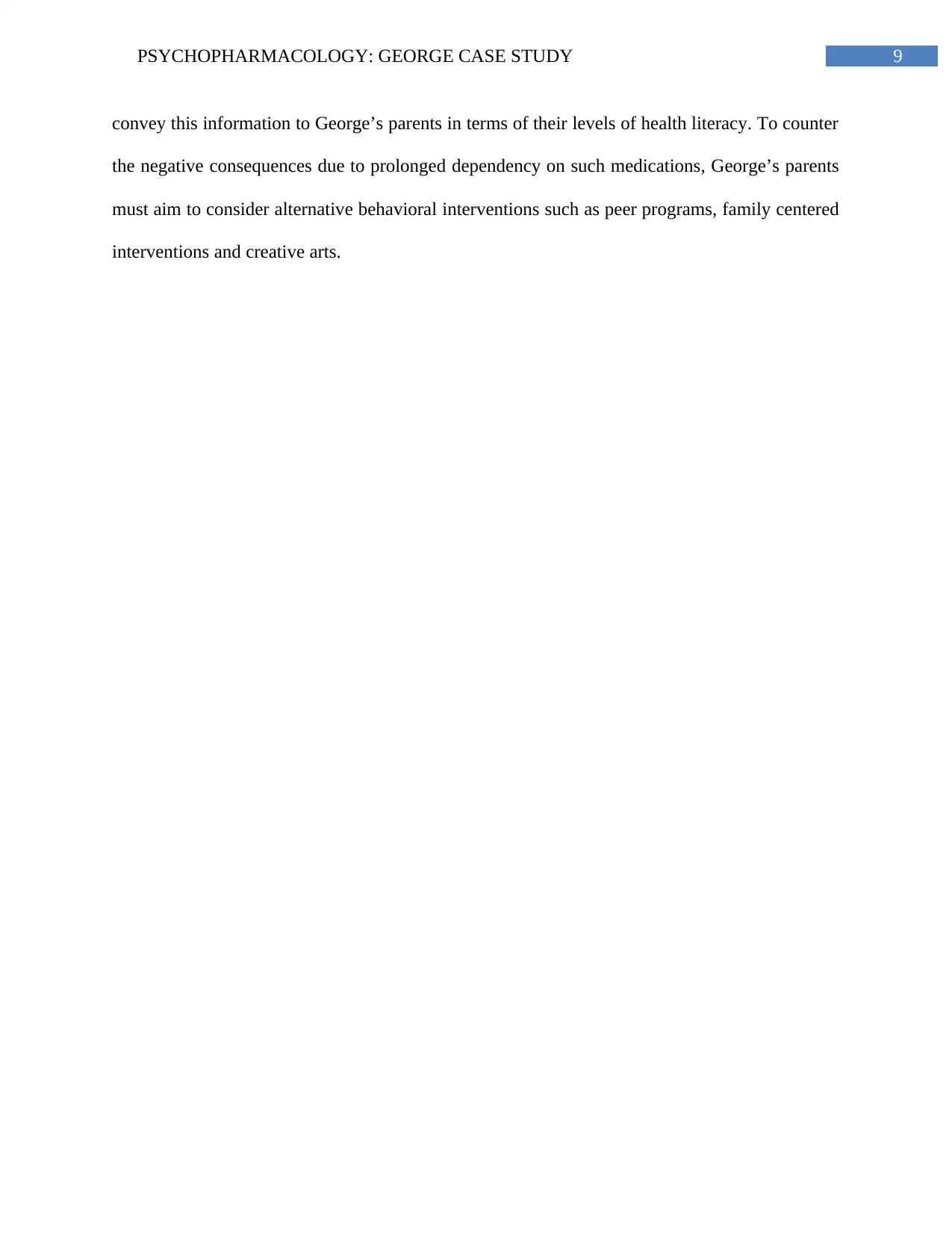
9PSYCHOPHARMACOLOGY: GEORGE CASE STUDY
convey this information to George’s parents in terms of their levels of health literacy. To counter
the negative consequences due to prolonged dependency on such medications, George’s parents
must aim to consider alternative behavioral interventions such as peer programs, family centered
interventions and creative arts.
convey this information to George’s parents in terms of their levels of health literacy. To counter
the negative consequences due to prolonged dependency on such medications, George’s parents
must aim to consider alternative behavioral interventions such as peer programs, family centered
interventions and creative arts.
Secure Best Marks with AI Grader
Need help grading? Try our AI Grader for instant feedback on your assignments.
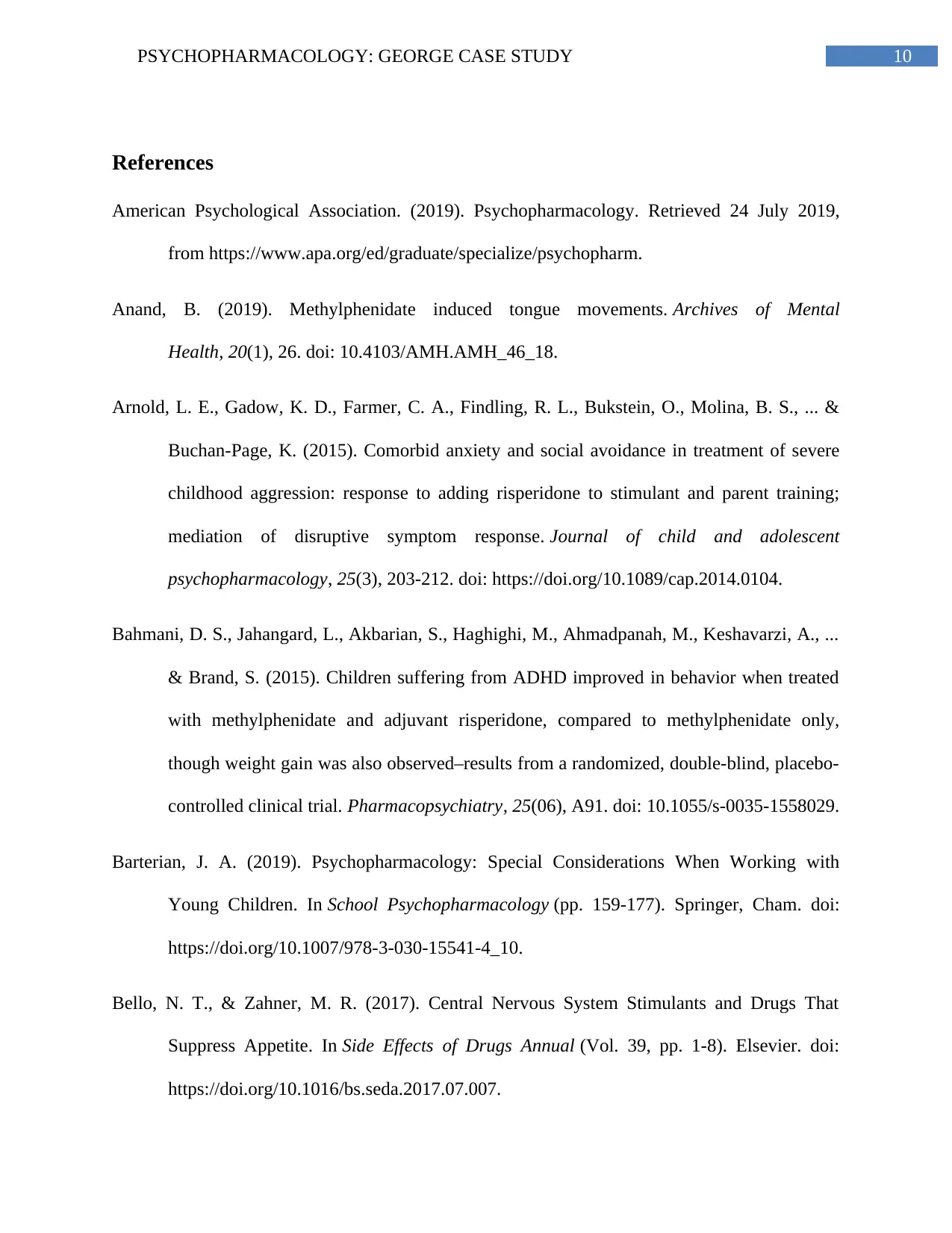
10PSYCHOPHARMACOLOGY: GEORGE CASE STUDY
References
American Psychological Association. (2019). Psychopharmacology. Retrieved 24 July 2019,
from https://www.apa.org/ed/graduate/specialize/psychopharm.
Anand, B. (2019). Methylphenidate induced tongue movements. Archives of Mental
Health, 20(1), 26. doi: 10.4103/AMH.AMH_46_18.
Arnold, L. E., Gadow, K. D., Farmer, C. A., Findling, R. L., Bukstein, O., Molina, B. S., ... &
Buchan-Page, K. (2015). Comorbid anxiety and social avoidance in treatment of severe
childhood aggression: response to adding risperidone to stimulant and parent training;
mediation of disruptive symptom response. Journal of child and adolescent
psychopharmacology, 25(3), 203-212. doi: https://doi.org/10.1089/cap.2014.0104.
Bahmani, D. S., Jahangard, L., Akbarian, S., Haghighi, M., Ahmadpanah, M., Keshavarzi, A., ...
& Brand, S. (2015). Children suffering from ADHD improved in behavior when treated
with methylphenidate and adjuvant risperidone, compared to methylphenidate only,
though weight gain was also observed–results from a randomized, double-blind, placebo-
controlled clinical trial. Pharmacopsychiatry, 25(06), A91. doi: 10.1055/s-0035-1558029.
Barterian, J. A. (2019). Psychopharmacology: Special Considerations When Working with
Young Children. In School Psychopharmacology (pp. 159-177). Springer, Cham. doi:
https://doi.org/10.1007/978-3-030-15541-4_10.
Bello, N. T., & Zahner, M. R. (2017). Central Nervous System Stimulants and Drugs That
Suppress Appetite. In Side Effects of Drugs Annual (Vol. 39, pp. 1-8). Elsevier. doi:
https://doi.org/10.1016/bs.seda.2017.07.007.
References
American Psychological Association. (2019). Psychopharmacology. Retrieved 24 July 2019,
from https://www.apa.org/ed/graduate/specialize/psychopharm.
Anand, B. (2019). Methylphenidate induced tongue movements. Archives of Mental
Health, 20(1), 26. doi: 10.4103/AMH.AMH_46_18.
Arnold, L. E., Gadow, K. D., Farmer, C. A., Findling, R. L., Bukstein, O., Molina, B. S., ... &
Buchan-Page, K. (2015). Comorbid anxiety and social avoidance in treatment of severe
childhood aggression: response to adding risperidone to stimulant and parent training;
mediation of disruptive symptom response. Journal of child and adolescent
psychopharmacology, 25(3), 203-212. doi: https://doi.org/10.1089/cap.2014.0104.
Bahmani, D. S., Jahangard, L., Akbarian, S., Haghighi, M., Ahmadpanah, M., Keshavarzi, A., ...
& Brand, S. (2015). Children suffering from ADHD improved in behavior when treated
with methylphenidate and adjuvant risperidone, compared to methylphenidate only,
though weight gain was also observed–results from a randomized, double-blind, placebo-
controlled clinical trial. Pharmacopsychiatry, 25(06), A91. doi: 10.1055/s-0035-1558029.
Barterian, J. A. (2019). Psychopharmacology: Special Considerations When Working with
Young Children. In School Psychopharmacology (pp. 159-177). Springer, Cham. doi:
https://doi.org/10.1007/978-3-030-15541-4_10.
Bello, N. T., & Zahner, M. R. (2017). Central Nervous System Stimulants and Drugs That
Suppress Appetite. In Side Effects of Drugs Annual (Vol. 39, pp. 1-8). Elsevier. doi:
https://doi.org/10.1016/bs.seda.2017.07.007.
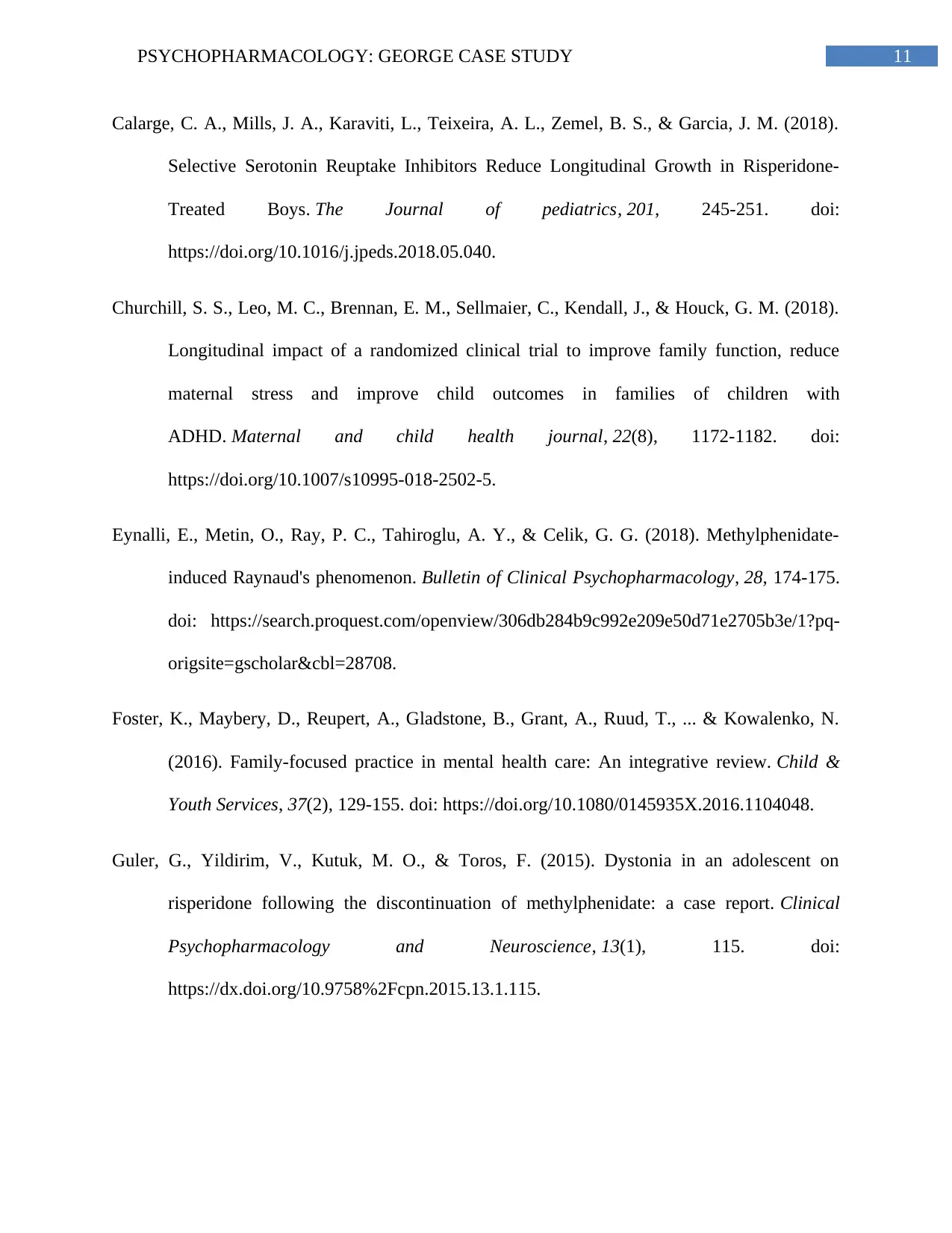
11PSYCHOPHARMACOLOGY: GEORGE CASE STUDY
Calarge, C. A., Mills, J. A., Karaviti, L., Teixeira, A. L., Zemel, B. S., & Garcia, J. M. (2018).
Selective Serotonin Reuptake Inhibitors Reduce Longitudinal Growth in Risperidone-
Treated Boys. The Journal of pediatrics, 201, 245-251. doi:
https://doi.org/10.1016/j.jpeds.2018.05.040.
Churchill, S. S., Leo, M. C., Brennan, E. M., Sellmaier, C., Kendall, J., & Houck, G. M. (2018).
Longitudinal impact of a randomized clinical trial to improve family function, reduce
maternal stress and improve child outcomes in families of children with
ADHD. Maternal and child health journal, 22(8), 1172-1182. doi:
https://doi.org/10.1007/s10995-018-2502-5.
Eynalli, E., Metin, O., Ray, P. C., Tahiroglu, A. Y., & Celik, G. G. (2018). Methylphenidate-
induced Raynaud's phenomenon. Bulletin of Clinical Psychopharmacology, 28, 174-175.
doi: https://search.proquest.com/openview/306db284b9c992e209e50d71e2705b3e/1?pq-
origsite=gscholar&cbl=28708.
Foster, K., Maybery, D., Reupert, A., Gladstone, B., Grant, A., Ruud, T., ... & Kowalenko, N.
(2016). Family-focused practice in mental health care: An integrative review. Child &
Youth Services, 37(2), 129-155. doi: https://doi.org/10.1080/0145935X.2016.1104048.
Guler, G., Yildirim, V., Kutuk, M. O., & Toros, F. (2015). Dystonia in an adolescent on
risperidone following the discontinuation of methylphenidate: a case report. Clinical
Psychopharmacology and Neuroscience, 13(1), 115. doi:
https://dx.doi.org/10.9758%2Fcpn.2015.13.1.115.
Calarge, C. A., Mills, J. A., Karaviti, L., Teixeira, A. L., Zemel, B. S., & Garcia, J. M. (2018).
Selective Serotonin Reuptake Inhibitors Reduce Longitudinal Growth in Risperidone-
Treated Boys. The Journal of pediatrics, 201, 245-251. doi:
https://doi.org/10.1016/j.jpeds.2018.05.040.
Churchill, S. S., Leo, M. C., Brennan, E. M., Sellmaier, C., Kendall, J., & Houck, G. M. (2018).
Longitudinal impact of a randomized clinical trial to improve family function, reduce
maternal stress and improve child outcomes in families of children with
ADHD. Maternal and child health journal, 22(8), 1172-1182. doi:
https://doi.org/10.1007/s10995-018-2502-5.
Eynalli, E., Metin, O., Ray, P. C., Tahiroglu, A. Y., & Celik, G. G. (2018). Methylphenidate-
induced Raynaud's phenomenon. Bulletin of Clinical Psychopharmacology, 28, 174-175.
doi: https://search.proquest.com/openview/306db284b9c992e209e50d71e2705b3e/1?pq-
origsite=gscholar&cbl=28708.
Foster, K., Maybery, D., Reupert, A., Gladstone, B., Grant, A., Ruud, T., ... & Kowalenko, N.
(2016). Family-focused practice in mental health care: An integrative review. Child &
Youth Services, 37(2), 129-155. doi: https://doi.org/10.1080/0145935X.2016.1104048.
Guler, G., Yildirim, V., Kutuk, M. O., & Toros, F. (2015). Dystonia in an adolescent on
risperidone following the discontinuation of methylphenidate: a case report. Clinical
Psychopharmacology and Neuroscience, 13(1), 115. doi:
https://dx.doi.org/10.9758%2Fcpn.2015.13.1.115.
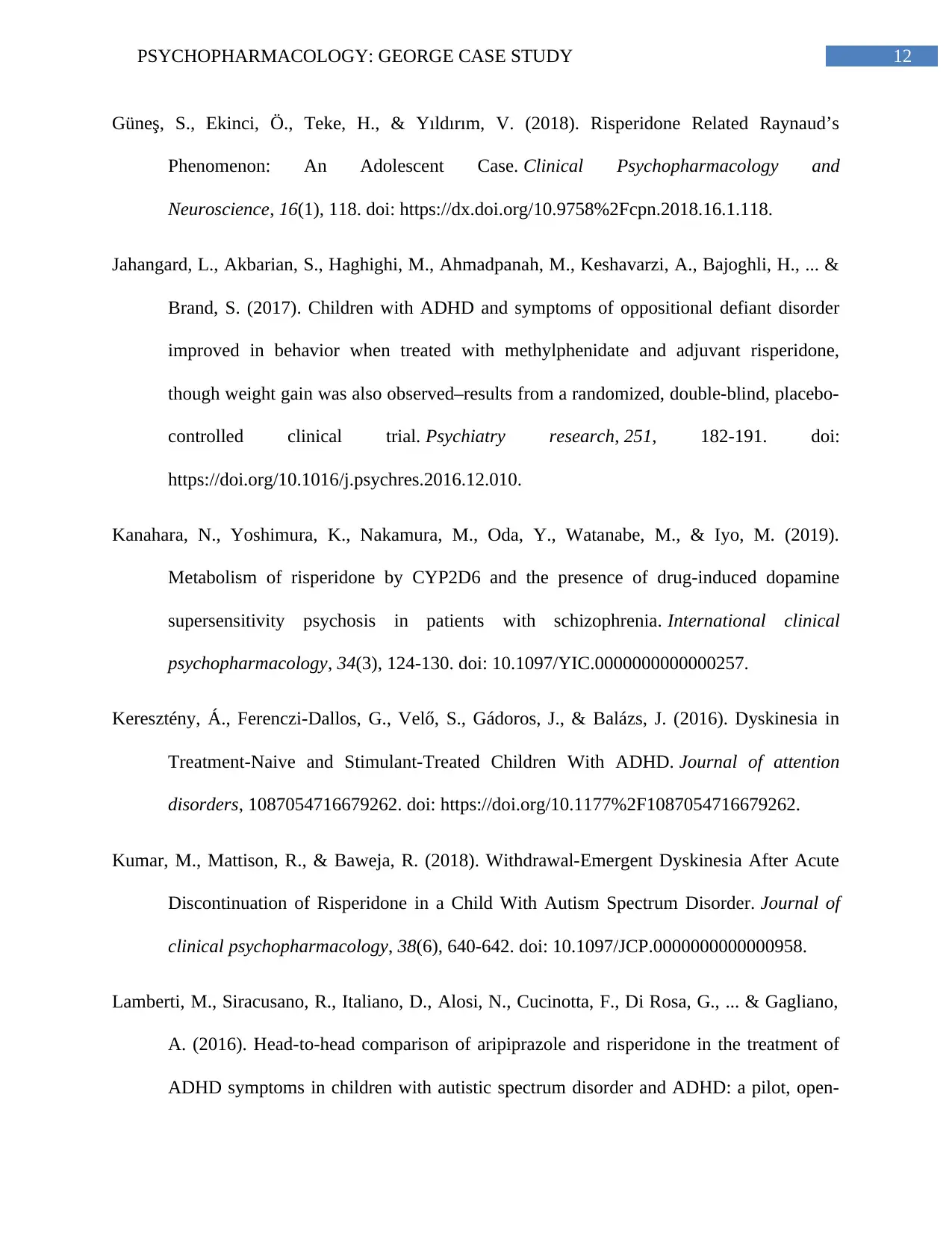
12PSYCHOPHARMACOLOGY: GEORGE CASE STUDY
Güneş, S., Ekinci, Ö., Teke, H., & Yıldırım, V. (2018). Risperidone Related Raynaud’s
Phenomenon: An Adolescent Case. Clinical Psychopharmacology and
Neuroscience, 16(1), 118. doi: https://dx.doi.org/10.9758%2Fcpn.2018.16.1.118.
Jahangard, L., Akbarian, S., Haghighi, M., Ahmadpanah, M., Keshavarzi, A., Bajoghli, H., ... &
Brand, S. (2017). Children with ADHD and symptoms of oppositional defiant disorder
improved in behavior when treated with methylphenidate and adjuvant risperidone,
though weight gain was also observed–results from a randomized, double-blind, placebo-
controlled clinical trial. Psychiatry research, 251, 182-191. doi:
https://doi.org/10.1016/j.psychres.2016.12.010.
Kanahara, N., Yoshimura, K., Nakamura, M., Oda, Y., Watanabe, M., & Iyo, M. (2019).
Metabolism of risperidone by CYP2D6 and the presence of drug-induced dopamine
supersensitivity psychosis in patients with schizophrenia. International clinical
psychopharmacology, 34(3), 124-130. doi: 10.1097/YIC.0000000000000257.
Keresztény, Á., Ferenczi-Dallos, G., Velő, S., Gádoros, J., & Balázs, J. (2016). Dyskinesia in
Treatment-Naive and Stimulant-Treated Children With ADHD. Journal of attention
disorders, 1087054716679262. doi: https://doi.org/10.1177%2F1087054716679262.
Kumar, M., Mattison, R., & Baweja, R. (2018). Withdrawal-Emergent Dyskinesia After Acute
Discontinuation of Risperidone in a Child With Autism Spectrum Disorder. Journal of
clinical psychopharmacology, 38(6), 640-642. doi: 10.1097/JCP.0000000000000958.
Lamberti, M., Siracusano, R., Italiano, D., Alosi, N., Cucinotta, F., Di Rosa, G., ... & Gagliano,
A. (2016). Head-to-head comparison of aripiprazole and risperidone in the treatment of
ADHD symptoms in children with autistic spectrum disorder and ADHD: a pilot, open-
Güneş, S., Ekinci, Ö., Teke, H., & Yıldırım, V. (2018). Risperidone Related Raynaud’s
Phenomenon: An Adolescent Case. Clinical Psychopharmacology and
Neuroscience, 16(1), 118. doi: https://dx.doi.org/10.9758%2Fcpn.2018.16.1.118.
Jahangard, L., Akbarian, S., Haghighi, M., Ahmadpanah, M., Keshavarzi, A., Bajoghli, H., ... &
Brand, S. (2017). Children with ADHD and symptoms of oppositional defiant disorder
improved in behavior when treated with methylphenidate and adjuvant risperidone,
though weight gain was also observed–results from a randomized, double-blind, placebo-
controlled clinical trial. Psychiatry research, 251, 182-191. doi:
https://doi.org/10.1016/j.psychres.2016.12.010.
Kanahara, N., Yoshimura, K., Nakamura, M., Oda, Y., Watanabe, M., & Iyo, M. (2019).
Metabolism of risperidone by CYP2D6 and the presence of drug-induced dopamine
supersensitivity psychosis in patients with schizophrenia. International clinical
psychopharmacology, 34(3), 124-130. doi: 10.1097/YIC.0000000000000257.
Keresztény, Á., Ferenczi-Dallos, G., Velő, S., Gádoros, J., & Balázs, J. (2016). Dyskinesia in
Treatment-Naive and Stimulant-Treated Children With ADHD. Journal of attention
disorders, 1087054716679262. doi: https://doi.org/10.1177%2F1087054716679262.
Kumar, M., Mattison, R., & Baweja, R. (2018). Withdrawal-Emergent Dyskinesia After Acute
Discontinuation of Risperidone in a Child With Autism Spectrum Disorder. Journal of
clinical psychopharmacology, 38(6), 640-642. doi: 10.1097/JCP.0000000000000958.
Lamberti, M., Siracusano, R., Italiano, D., Alosi, N., Cucinotta, F., Di Rosa, G., ... & Gagliano,
A. (2016). Head-to-head comparison of aripiprazole and risperidone in the treatment of
ADHD symptoms in children with autistic spectrum disorder and ADHD: a pilot, open-
Paraphrase This Document
Need a fresh take? Get an instant paraphrase of this document with our AI Paraphraser
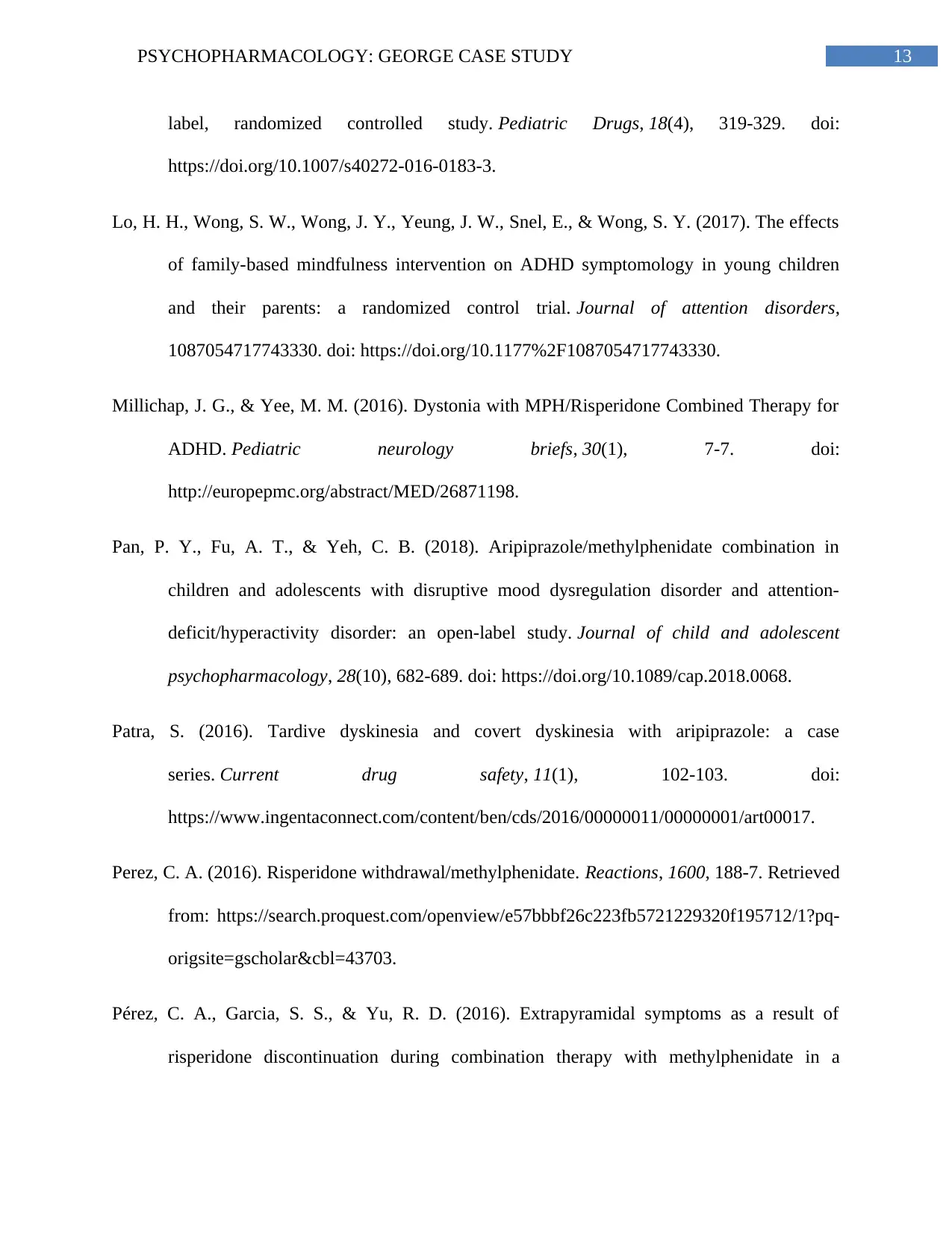
13PSYCHOPHARMACOLOGY: GEORGE CASE STUDY
label, randomized controlled study. Pediatric Drugs, 18(4), 319-329. doi:
https://doi.org/10.1007/s40272-016-0183-3.
Lo, H. H., Wong, S. W., Wong, J. Y., Yeung, J. W., Snel, E., & Wong, S. Y. (2017). The effects
of family-based mindfulness intervention on ADHD symptomology in young children
and their parents: a randomized control trial. Journal of attention disorders,
1087054717743330. doi: https://doi.org/10.1177%2F1087054717743330.
Millichap, J. G., & Yee, M. M. (2016). Dystonia with MPH/Risperidone Combined Therapy for
ADHD. Pediatric neurology briefs, 30(1), 7-7. doi:
http://europepmc.org/abstract/MED/26871198.
Pan, P. Y., Fu, A. T., & Yeh, C. B. (2018). Aripiprazole/methylphenidate combination in
children and adolescents with disruptive mood dysregulation disorder and attention-
deficit/hyperactivity disorder: an open-label study. Journal of child and adolescent
psychopharmacology, 28(10), 682-689. doi: https://doi.org/10.1089/cap.2018.0068.
Patra, S. (2016). Tardive dyskinesia and covert dyskinesia with aripiprazole: a case
series. Current drug safety, 11(1), 102-103. doi:
https://www.ingentaconnect.com/content/ben/cds/2016/00000011/00000001/art00017.
Perez, C. A. (2016). Risperidone withdrawal/methylphenidate. Reactions, 1600, 188-7. Retrieved
from: https://search.proquest.com/openview/e57bbbf26c223fb5721229320f195712/1?pq-
origsite=gscholar&cbl=43703.
Pérez, C. A., Garcia, S. S., & Yu, R. D. (2016). Extrapyramidal symptoms as a result of
risperidone discontinuation during combination therapy with methylphenidate in a
label, randomized controlled study. Pediatric Drugs, 18(4), 319-329. doi:
https://doi.org/10.1007/s40272-016-0183-3.
Lo, H. H., Wong, S. W., Wong, J. Y., Yeung, J. W., Snel, E., & Wong, S. Y. (2017). The effects
of family-based mindfulness intervention on ADHD symptomology in young children
and their parents: a randomized control trial. Journal of attention disorders,
1087054717743330. doi: https://doi.org/10.1177%2F1087054717743330.
Millichap, J. G., & Yee, M. M. (2016). Dystonia with MPH/Risperidone Combined Therapy for
ADHD. Pediatric neurology briefs, 30(1), 7-7. doi:
http://europepmc.org/abstract/MED/26871198.
Pan, P. Y., Fu, A. T., & Yeh, C. B. (2018). Aripiprazole/methylphenidate combination in
children and adolescents with disruptive mood dysregulation disorder and attention-
deficit/hyperactivity disorder: an open-label study. Journal of child and adolescent
psychopharmacology, 28(10), 682-689. doi: https://doi.org/10.1089/cap.2018.0068.
Patra, S. (2016). Tardive dyskinesia and covert dyskinesia with aripiprazole: a case
series. Current drug safety, 11(1), 102-103. doi:
https://www.ingentaconnect.com/content/ben/cds/2016/00000011/00000001/art00017.
Perez, C. A. (2016). Risperidone withdrawal/methylphenidate. Reactions, 1600, 188-7. Retrieved
from: https://search.proquest.com/openview/e57bbbf26c223fb5721229320f195712/1?pq-
origsite=gscholar&cbl=43703.
Pérez, C. A., Garcia, S. S., & Yu, R. D. (2016). Extrapyramidal symptoms as a result of
risperidone discontinuation during combination therapy with methylphenidate in a
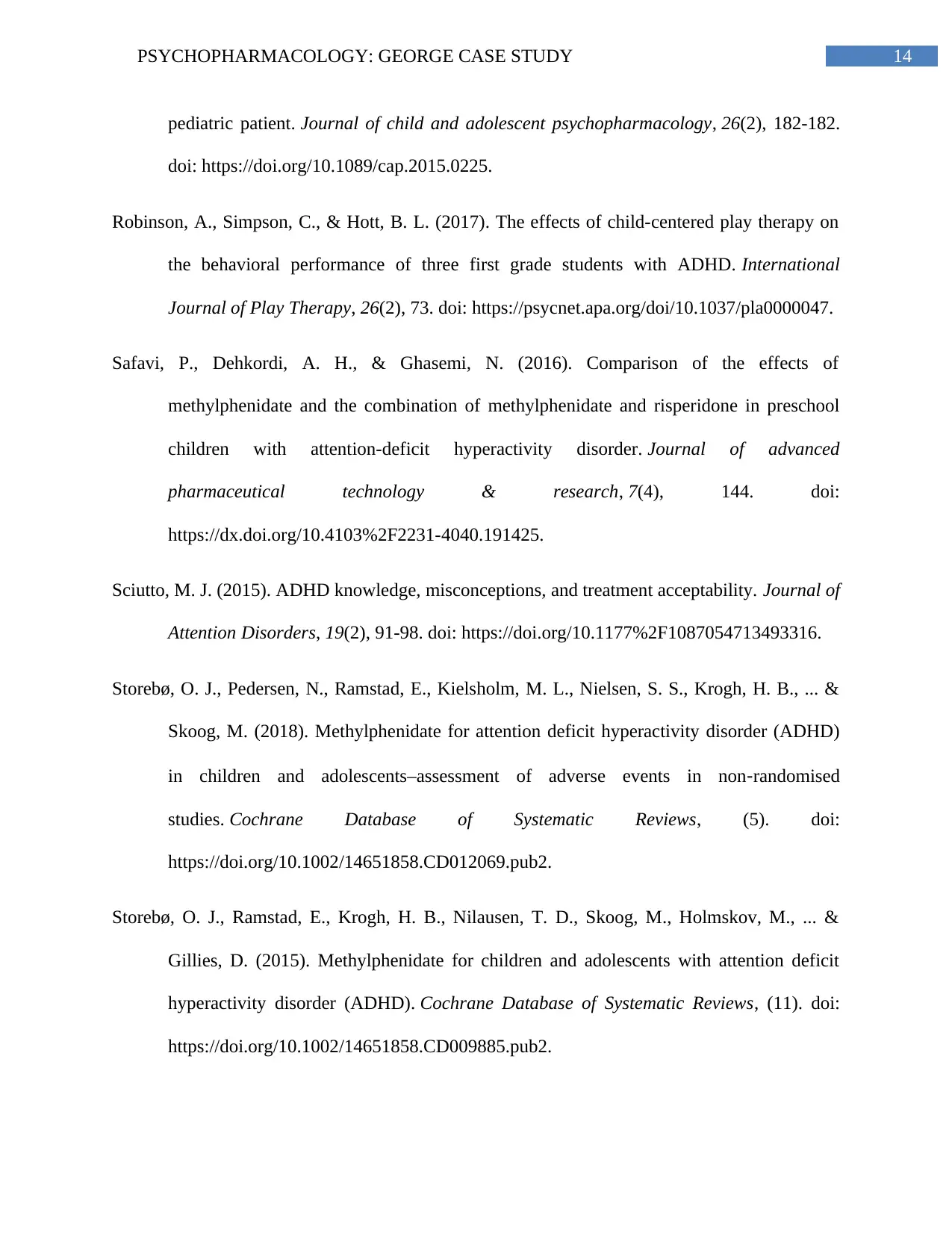
14PSYCHOPHARMACOLOGY: GEORGE CASE STUDY
pediatric patient. Journal of child and adolescent psychopharmacology, 26(2), 182-182.
doi: https://doi.org/10.1089/cap.2015.0225.
Robinson, A., Simpson, C., & Hott, B. L. (2017). The effects of child-centered play therapy on
the behavioral performance of three first grade students with ADHD. International
Journal of Play Therapy, 26(2), 73. doi: https://psycnet.apa.org/doi/10.1037/pla0000047.
Safavi, P., Dehkordi, A. H., & Ghasemi, N. (2016). Comparison of the effects of
methylphenidate and the combination of methylphenidate and risperidone in preschool
children with attention-deficit hyperactivity disorder. Journal of advanced
pharmaceutical technology & research, 7(4), 144. doi:
https://dx.doi.org/10.4103%2F2231-4040.191425.
Sciutto, M. J. (2015). ADHD knowledge, misconceptions, and treatment acceptability. Journal of
Attention Disorders, 19(2), 91-98. doi: https://doi.org/10.1177%2F1087054713493316.
Storebø, O. J., Pedersen, N., Ramstad, E., Kielsholm, M. L., Nielsen, S. S., Krogh, H. B., ... &
Skoog, M. (2018). Methylphenidate for attention deficit hyperactivity disorder (ADHD)
in children and adolescents–assessment of adverse events in non‐randomised
studies. Cochrane Database of Systematic Reviews, (5). doi:
https://doi.org/10.1002/14651858.CD012069.pub2.
Storebø, O. J., Ramstad, E., Krogh, H. B., Nilausen, T. D., Skoog, M., Holmskov, M., ... &
Gillies, D. (2015). Methylphenidate for children and adolescents with attention deficit
hyperactivity disorder (ADHD). Cochrane Database of Systematic Reviews, (11). doi:
https://doi.org/10.1002/14651858.CD009885.pub2.
pediatric patient. Journal of child and adolescent psychopharmacology, 26(2), 182-182.
doi: https://doi.org/10.1089/cap.2015.0225.
Robinson, A., Simpson, C., & Hott, B. L. (2017). The effects of child-centered play therapy on
the behavioral performance of three first grade students with ADHD. International
Journal of Play Therapy, 26(2), 73. doi: https://psycnet.apa.org/doi/10.1037/pla0000047.
Safavi, P., Dehkordi, A. H., & Ghasemi, N. (2016). Comparison of the effects of
methylphenidate and the combination of methylphenidate and risperidone in preschool
children with attention-deficit hyperactivity disorder. Journal of advanced
pharmaceutical technology & research, 7(4), 144. doi:
https://dx.doi.org/10.4103%2F2231-4040.191425.
Sciutto, M. J. (2015). ADHD knowledge, misconceptions, and treatment acceptability. Journal of
Attention Disorders, 19(2), 91-98. doi: https://doi.org/10.1177%2F1087054713493316.
Storebø, O. J., Pedersen, N., Ramstad, E., Kielsholm, M. L., Nielsen, S. S., Krogh, H. B., ... &
Skoog, M. (2018). Methylphenidate for attention deficit hyperactivity disorder (ADHD)
in children and adolescents–assessment of adverse events in non‐randomised
studies. Cochrane Database of Systematic Reviews, (5). doi:
https://doi.org/10.1002/14651858.CD012069.pub2.
Storebø, O. J., Ramstad, E., Krogh, H. B., Nilausen, T. D., Skoog, M., Holmskov, M., ... &
Gillies, D. (2015). Methylphenidate for children and adolescents with attention deficit
hyperactivity disorder (ADHD). Cochrane Database of Systematic Reviews, (11). doi:
https://doi.org/10.1002/14651858.CD009885.pub2.
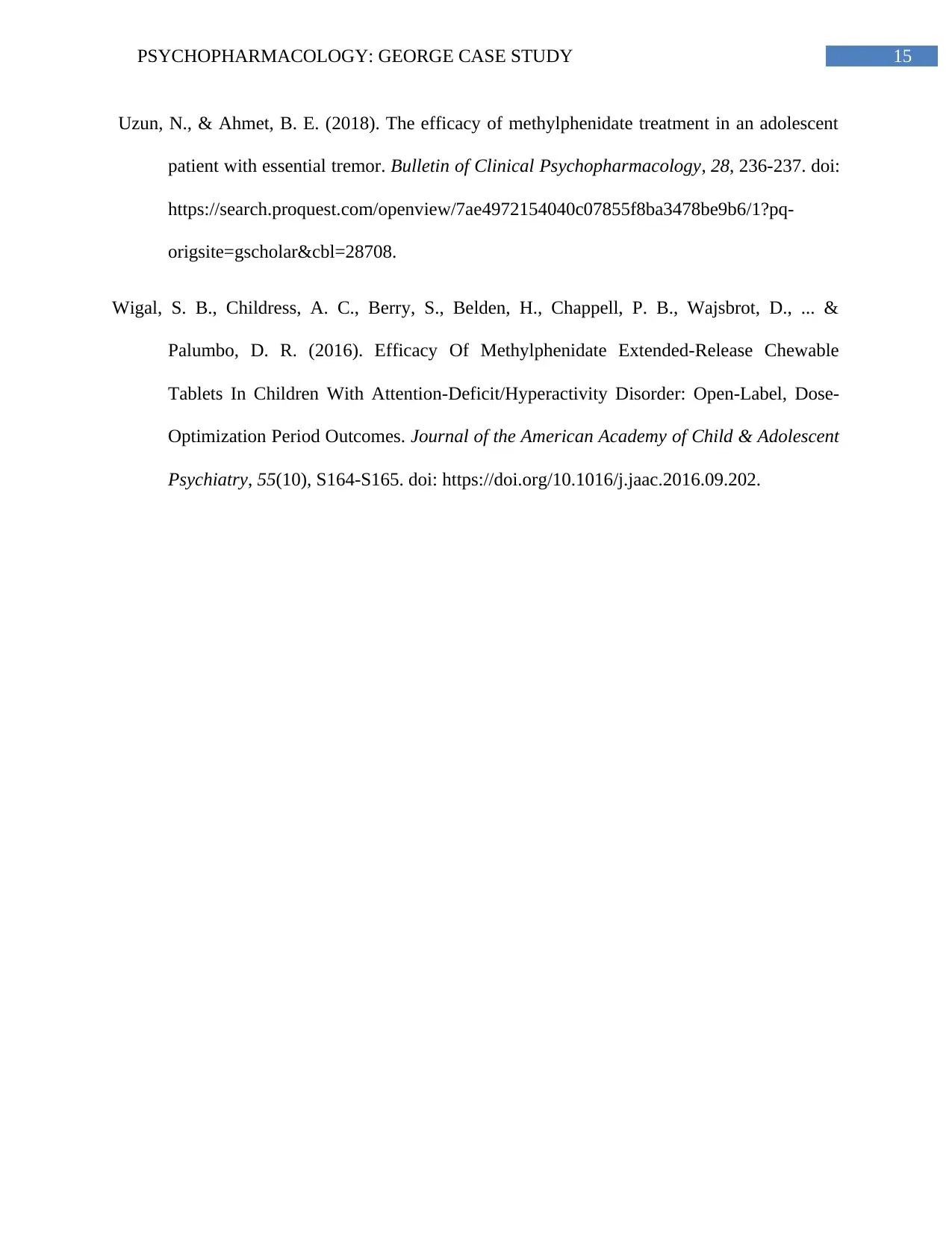
15PSYCHOPHARMACOLOGY: GEORGE CASE STUDY
Uzun, N., & Ahmet, B. E. (2018). The efficacy of methylphenidate treatment in an adolescent
patient with essential tremor. Bulletin of Clinical Psychopharmacology, 28, 236-237. doi:
https://search.proquest.com/openview/7ae4972154040c07855f8ba3478be9b6/1?pq-
origsite=gscholar&cbl=28708.
Wigal, S. B., Childress, A. C., Berry, S., Belden, H., Chappell, P. B., Wajsbrot, D., ... &
Palumbo, D. R. (2016). Efficacy Of Methylphenidate Extended-Release Chewable
Tablets In Children With Attention-Deficit/Hyperactivity Disorder: Open-Label, Dose-
Optimization Period Outcomes. Journal of the American Academy of Child & Adolescent
Psychiatry, 55(10), S164-S165. doi: https://doi.org/10.1016/j.jaac.2016.09.202.
Uzun, N., & Ahmet, B. E. (2018). The efficacy of methylphenidate treatment in an adolescent
patient with essential tremor. Bulletin of Clinical Psychopharmacology, 28, 236-237. doi:
https://search.proquest.com/openview/7ae4972154040c07855f8ba3478be9b6/1?pq-
origsite=gscholar&cbl=28708.
Wigal, S. B., Childress, A. C., Berry, S., Belden, H., Chappell, P. B., Wajsbrot, D., ... &
Palumbo, D. R. (2016). Efficacy Of Methylphenidate Extended-Release Chewable
Tablets In Children With Attention-Deficit/Hyperactivity Disorder: Open-Label, Dose-
Optimization Period Outcomes. Journal of the American Academy of Child & Adolescent
Psychiatry, 55(10), S164-S165. doi: https://doi.org/10.1016/j.jaac.2016.09.202.
1 out of 16
Your All-in-One AI-Powered Toolkit for Academic Success.
+13062052269
info@desklib.com
Available 24*7 on WhatsApp / Email
![[object Object]](/_next/static/media/star-bottom.7253800d.svg)
Unlock your academic potential
© 2024 | Zucol Services PVT LTD | All rights reserved.

